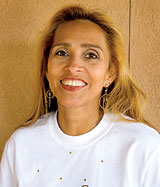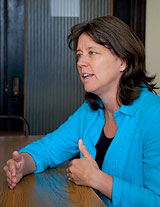
Gordon Smith: “I decided to stop being angry. … I found that action was the best antidote to that pessimism and disenfranchisement.” photo by Jonathan Welch
|
Whether working at the grassroots level or in the blogosphere, local liberals, progressives and moderates are hoping that the upcoming elections will mark a leftward shift in the political climate.
In Asheville and throughout Western North Carolina, individuals and groups ranging from the local Democratic Party to MoveOn.org are working to get their people to the polls en masse. The message this year? Just win, baby.
At stake, these activists say, is a whole host of big issues: everything from the future of health care to environmental sustainability to education, jobs and protections for workers, and an end to the war. Progressives say they want immigration reform to be fair; they also want equality for gays and lesbians. A key focus locally is giving area residents a say in how these mountains are developed.
Here’s a look at some local activists on the left.
An antidote to pessimism
By his own admission, the political response to 9/11 left hard-core Democrat Gordon Smith feeling angry and powerless. “It was just fear and loathing before then, but then it became utter depression in ’04, and I just felt paralyzed” after the re-election of George W. Bush, he says.
Somewhere along the way, however, “I decided to stop being angry,” says Smith, a therapist by profession. “It was eating me up. I found that action was the best antidote to that pessimism and disenfranchisement.”
So Smith launched a blog, Scrutiny Hooligans. “It’s not that hard for anybody to get off their ass and do something,” he says. “If you’re willing to devote 1 percent of your life to creating a better political environment (which translates to 100 minutes a week) … your 1 percent may wind up being the tipping point.”
A political rabble-rouser, Smith prefers to work independently. “With the type of messaging I like to do, it tends to make campaigns a little more nervous. I do stuff that’s a bit more controversial and a little less measured than campaigns would like. I think I’d be a problem for them if we had a relationship.”
He helped launch the local chapter of Drinking Liberally, which brings Democrats together weekly to hoist a few beers, talk politics and plot guerrilla strategy. And almost every day, Smith’s blog chronicles the latest doings of Rep. Charles Taylor and other Republicans, while helping promote Democrats. Scrutiny Hooligans gets upward of 300 hits per day, says Smith, and his guest-blogging at BlueNC and on the national blogs MyDD and Daily Kos draws far more hits.
But the latest example of Smith’s edgy activism is WNCNN, a satirical/farcical assault on Taylor. Using the wildly popular video Web site YouTube.com, Smith and his compatriots post a 10-minute faux news show each week with shades of The Daily Show. Smith says he’s shooting for 10,000 viewers, with at least 1,000 in the 11th District.
“I know Taylor’s folks are watching it,” he says. “So that will be 10 minutes a week they won’t be doing something else. Then they will think about it, and then they will go to lunch and talk about it. Actually, they are my main audience.”
The blogger sees the state House races and the Buncombe County sheriff’s race as the area’s other key contests. “We have a surprisingly good candidate [in Van Duncan],” says Smith. “It takes a lot of guts to run against Bobby Medford.”
Smith’s also tracking the 116th District state House race. If Democrat Doug Jones wins, he’d be the only schoolteacher in the General Assembly, the blogger notes (see “The Art of Compromise” below). Both Jones and opponent Charles Thomas, says Smith, are de-emphasizing their party roots to court unaffiliated voters. Jones, says Smith, is “essentially running a nonpartisan race. There’s [roughly] 30 percent of the voters who are libertarian who, if a candidate says, ‘I’ll leave you alone and won’t raise your taxes,’ they’ll vote for you.”
Smith sees synergy as helping the Democrats in November. “You have [state Rep.] Susan Fisher, Jones and [congressional candidate Heath] Shuler all on the same ticket. If voters show up for any of those three candidates or even Van Duncan, then all those Dems are going to get hits. This is why it’s really important for Susan or Doug to get their message out as much as possible. … All that wealth will get spread around.”
Empowering Latinos

Edna Campos: “Latinos are being stereotyped as all undocumented, all uneducated, all illiterate. And if we don’t voice our strength at the polls, we will only fall to those stereotypes.” photo by Jonathan Welch
|
Edna Campos sees a lot of things she doesn’t like these days. An American-born woman of Mexican descent, Campos says her fellow Latinos are being demonized in Congress, on roadside billboards and on right-wing talk radio. And though the topic is supposed to be illegal immigration, Campos and others say they find it hard not to suspect outright bigotry lurking within.
But Campos is not the kind of woman to simply get mad: She fights back.
A native Texan who’s lived in Asheville part time for 10 years, Campos is a political consultant and public-relations professional. The scion of a politically active family, she now works locally, statewide and nationally with any number of nonpartisan, nonprofit organizations that cater to Latinos. Campos is the public voice for We Are One America of WNC, the coalition that spearheaded last May’s massive downtown demonstration calling for fair and comprehensive immigration reform.
Ultimately, Campos’ goal is empowering the Latino community — educating people about their rights as American citizens and the importance of voting. Latinos, she emphasizes, have the same concerns as other Americans. “We’re not stupid; we’re about more than one issue.”
To Campos, the key contests are the congressional race, the state House races and the Buncombe County sheriff’s race. A Democrat, she likes the party’s prospects this year. Accordingly, Campos and others are making a concerted effort to register people and get them to the polls. “This has really been the first year, in this part of the state, that this is really taking off,” she notes.
Campos says her main concern is not swaying voters but simply getting legal residents to vote. Working with the Coalition of Latino Organizations and other groups, Campos and her colleagues held a workshop in August that taught 70 volunteers how to register voters.
“We really tried to impress upon people … that the Latino vote in this election could have a big impact. Because if we could just get five or six people to vote per precinct, we could really turn some elections in some unanticipated directions,” says Campos, who has worked on similar projects in other states.
“I have 20 years’ experience working with Latino voters, and I know there will be some people who will try to … challenge them and intimidate them and turn them away. … It’s my goal that we get the best training we can to our folks and equip them with what they’ll need on Election Day to go and feel comfortable about exercising their right to vote.”
In the wake of the brouhaha sparked by the Buncombe County Republican Action Club’s controversial billboards (see companion story, “Right on Target”), Campos says about 45 Latinos and other concerned citizens met to discuss the issue, but the Action Club representative who attended refused to discuss the billboards’ purpose.
“It was very disappointing that she declined to participate with any dialogue,” Campos observes. Still, she believes the immigration issue could turn out to be what solidifies the nation’s large and growing Latino population as a powerful voting bloc.
“Socially, Latinos are being stereotyped as all undocumented, all uneducated, all illiterate,” notes Campos. “And if we don’t voice our strength at the polls, we will only fall to those stereotypes.”
The art of compromise
While much of the election furor revolves around partisan politics, Democratic candidate Doug Jones believes that both his own contest (for the 116th District House seat) and other state House races may hinge on independent voters.
Make no mistake: Jones, who teaches 11th-grade U.S. History at Enka High School, is a true-blue Democrat. A stalwart in the Buncombe County Democratic Party, he’s past president of the local chapter of Young Democrats of North Carolina (hailed as the nation’s top chapter while under Jones’ leadership).
“But I’m not intending to serve as a partisan creature when I’m in Raleigh,” says Jones. “When you are elevated to elective office, I think you take on additional responsibility. So I just tell folks I’m running to represent working families in Buncombe County; I’m not running to represent a political party. They appreciate that.” The candidate’s key issues — ethics reform, health-care access and affordability, educational reform, job creation and environmental protection — resonate across the political spectrum, he believes.
The way Jones sees it, Democrats need to truly embrace their “big tent” philosophy. There’s plenty of room for differing ideologies, he says, which is one reason Jones finds Heath Shuler an attractive candidate.
“It’s sometimes hard for folks in Asheville to recognize what makes a candidate successful throughout Western North Carolina,” notes Jones. “They want a candidate that’s acceptable to them, but at the same time we have to compromise and make sure we have a candidate that’s acceptable to everyone in Western North Carolina. [Shuler is] more moderate than a lot of people; he’s more conservative than some people. But that’s what politics is about. … [Shuler] has the makings of what I think could be a kind of mountain populist.”
Apart from those races, Jones feels the nonpartisan judges’ contests may be the most critical. “I would really encourage people to take a close look at these races … and avail themselves of all the resources they can find,” he says. “Because these judicial races are extraordinarily important … and many voters, because they don’t know [enough about the candidates], simply don’t vote.”
To Jones, the single most important issue is health care — making it more affordable and accessible. “That includes a range of things,” he notes. “We’ve just seen the collapse of New Vistas, and that brings home to us the importance of mental health. And I think there needs to be a more comprehensive health-care solution that includes taking care of our most vulnerable citizens. In general, we should look to health-care reform to create real health-care security for our people. Because what I’ve learned is that we can’t have a secure future without secure families.”
Besides helping families, such reform would also boost the economy by lifting some of the crushing burden from employers who struggle to keep pace with the rising cost of health benefits, says Jones.
“Twenty-one percent of our people in Buncombe County don’t have health care, and we have a [low] unemployment rate,” he points out, adding that the percentage of employers providing health insurance has shrunk dramatically over the past decade. “People are working, they’re playing by the rules, and they ought to be able to afford quality health care for themselves and their families.”
Taking the long view

Robin Cape: “I think the important thing for liberals to remember is that if we care about diversity, that means allowing some people to be different from us.” photo by Jonathan Welch
|
After launching her political career with a successful write-in campaign for a seat on the Woodfin Water Board (a first in Buncombe County), you might expect current Asheville City Council member Robin Cape to be right in the thick of the this electoral season. But with no Council members up for re-election, Cape says she’s watching from the sidelines this year as she focuses on learning her new job and achieving legislative goals.
Still, her experience on Council has deepened her perspective on local politics. The key contests this year, says Cape, are the 11th District congressional race and the one pitting Democrat Doug Jones against Republican Charles Thomas to claim the 116th District state House seat being vacated by retiring Republican Rep. Wilma Sherrill. “I think that’s a real important race for our district,” says Cape. “It’s an open seat a Democrat can take.”
As for the congressional race, “I don’t have a clue,” she says. While Heath Shuler appears to be faring better than any previous Taylor opponent, the challenger’s moderate-to-conservative views on such things as gun control, abortion and immigration have many local liberals in a quandary that will trip up Democrats again if they’re not careful, Cape warns.
“Strategically, Democrats and progressive people in general … have a frustration with the way things are going. So I think you have to support Heath Shuler; whether he’s your favorite candidate or your dream candidate is beside the point. I hear too many hemming and hawing about this race — that he’s not liberal enough. I think the important thing for liberals to remember is that if we care about diversity, that means allowing some people to be different from us.”
The bottom line, says Cape, is that Democrats need to recapture the House. “If we don’t support Heath over the things we don’t like about him, I think we lose out in the long run.”
Democrats, she maintains, must stop pining for a dream candidate who will probably never emerge. And many Gen-X and baby boomer Democrats, she believes, tend to be short on patience.
“If we have a little loss, or if somebody does something that disappoints us, they like to throw the whole baby out with the bath water and just give up,” she says. “We haven’t learned the longevity of the struggle. I think we’ve had it too easy our whole life.”
As an example, Cape points to e-mails circulating about the fact that environmental stalwart Al Gore’s cars and home are not energy-efficient. “Yet the man is working 24/7 trying to wake up the world,” she says. Gore’s recent film on global warming has become one of the highest-grossing documentaries ever made.
“I think progressives have become really bad about creating celebrities,” says Cape. And if the celebrity doesn’t live up to that ideal, “they trash them. They say, ‘That’s it — I’m through.'” One of the primary keys to victory both this year and in the future, she adds, is “the ability to hang in there and work for something despite disappointments and struggles.”





Before you comment
The comments section is here to provide a platform for civil dialogue on the issues we face together as a local community. Xpress is committed to offering this platform for all voices, but when the tone of the discussion gets nasty or strays off topic, we believe many people choose not to participate. Xpress editors are determined to moderate comments to ensure a constructive interchange is maintained. All comments judged not to be in keeping with the spirit of civil discourse will be removed and repeat violators will be banned. See here for our terms of service. Thank you for being part of this effort to promote respectful discussion.